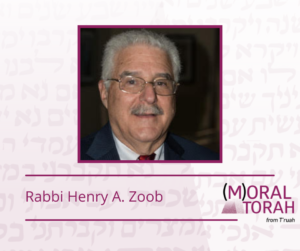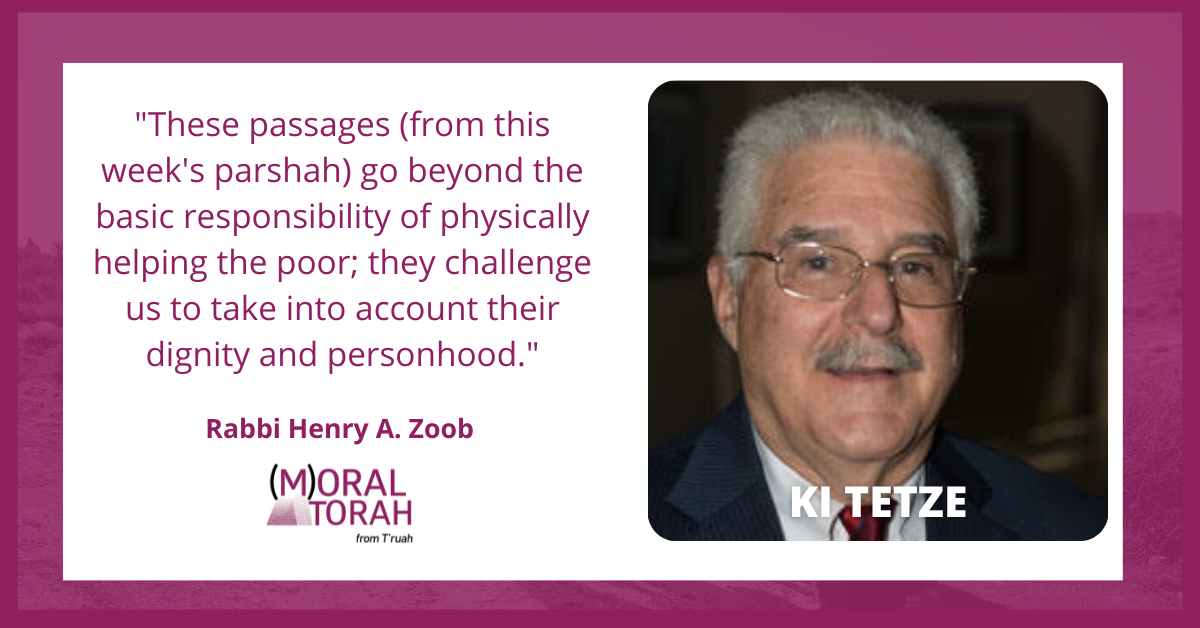A D’var Torah for Ki Tetze by Rabbi Henry A. Zoob
Sometimes when I walk in downtown Boston or am in my car at a red light, I am approached by someone requesting money. They often carry a sign which says something to the effect of “I have three children and no money to feed them. Will you help me?”
Often my first impulse is to give. Indeed, Rambam says, “Anyone who puts out his hand to receive should be given money.” But there are times when a less compassionate part of me says, “What a bother! Now I have to look in my wallet to see what I have. Should I give a couple of dollars or perhaps more?” And then I think, “Why isn’t this person working through social services to get some financial and practical help, instead of causing a problem in the midst of heavy traffic or occupying sidewalk space?” And even after I have given, I am left with a sense of sadness, “Here is someone living in the wealthiest country in the world who does not have enough funds for food and shelter. What a shonda!”
The figures from the US Census Bureau reveal that 37 million Americans — 11%, or slightly more than one in 10 — live in poverty. But I wonder sometimes if statistics like that don’t really help us understand the problem, because they make the poor appear as faceless ciphers, not individual human beings with their own stories.
Sign up to receive (M)oral Torah in your inbox each week.
In our Torah portion Ki Tetze, we find two passages that remind us of the exact opposite, that poor people are people whose individual dignity matters, and we are commanded to treat them as we would want to be treated, with care and respect. Deuteronomy 24:10-13 forbids a creditor from entering a debtor’s home to seize one of his possessions as a pledge. In order to maintain the dignity of the debtor, the creditor must allow the debtor to select his own collateral. Seizing a pledge could be particularly demeaning if the debtor’s family is present. Imagine watching a stranger barge in to seize your parent or spouse’s treasured possession! The passage goes on to say that in the case of a destitute person whose only property is the cloak in which he sleeps, the creditor may not sleep in that pledged garment but must return it before each sundown, so that the debtor can keep himself warm during the night. The creditor’s technical right to the cloak does not override the debtor’s basic rights and dignity.
The second passage, Deuteronomy 24:14-15, instructs an employer to pay the wages of a destitute Israelite or resident alien on the very day of his labor before the sun sets, because he is needy and may require his daily wages to obtain food and shelter. When I read this passage, I cannot help but think of Aaron Feuerstein, owner of Malden Mills in the Boston area. After a catastrophic fire in 1995, Mr. Feuerstein continued to pay the 3,000 workers at his textile plant their wages and benefits for 90 days. As a guest speaker at my synagogue, Feuerstein cited his Jewish upbringing as the major reason for his compassionate response to the difficult straits of his workers.
Find more commentaries on Parshat Ki Tetze.
These passages go beyond the basic responsibility of physically helping the poor; they challenge us to take into account their dignity and personhood. This brings to mind for me an experience I had as a teenager, 66 years ago. As a junior at Friends’ Central School in Philadelphia, I had the opportunity to attend a Quaker weekend work camp in a poor Black section of the city. A classmate, Marilyn, and I spent an entire day in the row home of Mrs. Moore, helping her paint her living room. The day before we were scheduled to paint, we visited her with samples of the available colors. She selected a light blue that seemed perfect to us. It was early April, but when we returned the next morning, it was very cold in the house. Mrs. Moore told us the boiler had failed in the night. She then picked up a brush and we began to paint. As we worked, we warmed up and got to know each other. Mrs. Moore shared some stories about her youth in South Carolina, and when it was time for lunch, she made us some hot Campbell’s tomato soup to go along with the sandwiches we had brought. At the end of the day, the light blue walls of Mrs. Moore’s living room looked great.  We felt proud of our joint effort. We were especially grateful for our experience with Mrs. Moore on a personal level. We had gained respect for her, shared a project with her, and in doing so, we had gathered some insights into the challenges she faced as a poor woman living alone. This was obviously impactful for me, as I still recall it so many years later. For Marilyn and me, poverty was no longer an abstract term; it had a face and a personal identity. That, more than any statistic or government program, is the lesson I take from Ki Tetze.
We felt proud of our joint effort. We were especially grateful for our experience with Mrs. Moore on a personal level. We had gained respect for her, shared a project with her, and in doing so, we had gathered some insights into the challenges she faced as a poor woman living alone. This was obviously impactful for me, as I still recall it so many years later. For Marilyn and me, poverty was no longer an abstract term; it had a face and a personal identity. That, more than any statistic or government program, is the lesson I take from Ki Tetze.
Rabbi Henry A. Zoob is the Rabbi Emeritus of Temple Beth David, in Westwood, MA, a suburb of Boston. He is the Founding Chair of the Rashi School, the Boston Area Reform Jewish K-8 Independent School.

